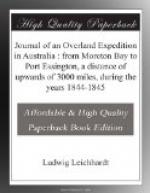Dec. 3.—The natives visited us very early in the morning, with their wives and children, whom they introduced to us. There could not have been less than 200 of them present; they were all well made, active, generally well-looking, with an intelligent countenance: they had in fact all the characters of the coast blacks of a good country; but without their treacherous dispositions. I started in a north-east direction; and as we were accompanied by the natives, I led our bullock, by the noserope, behind my horse. After crossing a plain, we were stopped by a large sheet of salt-water, about three or four miles broad, at the opposite side of which a low range was visible; when Eooanberry explained that we had to go far to the south-east and south, before we could cross the river, and that we had to follow it down again at the other side. He expressed his great attachment to his wife and child, and obtained leave of us to return to his tribe, which had already retired before him. Seeing the necessity of heading the river, which I considered to be the East Alligator; the longitude of which was, where we first came to it, 132 degrees 40 minutes according to reckoning; I returned to the forest land, and travelled along its belt of Pandanus, to obtain a better ground for our cattle, and to avoid the scorching heat of the forenoon sun. Observing some singularly formed mountains rising abruptly out of the plains and many pillars of smoke behind them, I tried to get to them, but was again prevented by the broad salt water. We now steered for a distant smoke to the south-east by east, and had travelled fully seventeen miles on, or along extensive plains, when we perceived seven natives returning on a beaten foot-path, from the salt water to the forest. We cooeed—they ran! But when we had passed, and Charley stopped behind alone, they came up to him, and, having received some presents, they showed us some miserable wells between two tea-tree groves; after which they hastened home. Our cattle were tired and thirsty, but we could give them nothing to drink, except about six quarts of brackish water; which fell to the share of our bullock. The feed, however, was rich and young, and during the night a heavy dew was deposited, Many flocks of geese came flying low over the plains, which made us hope that water was not very distant. Whilst we were passing the head of a small Mangrove creek, four native dogs, started out of a shady hole; but we looked in vain for fresh water. The plains, which were very level, with a few melon-holes, were scattered all over with dead Limnaeas, which showed evidently, that fresh, or slightly brackish water, covered them occasionally, and for some length of time. Since we first entered upon the large plains of the Alligator Rivers, we had seen myriads of the small cockatoo (Cocatua sanguinea, Gould), which retired towards night, in long flights from the plains, to the shade of the drooping tea-trees near the shallow pools of water on which we encamped. We had also observed several retreats of flying-foxes in the most shady parts of the Pandanus groves, receiving frequently the first indication of them by the peculiar odour of the animal.




